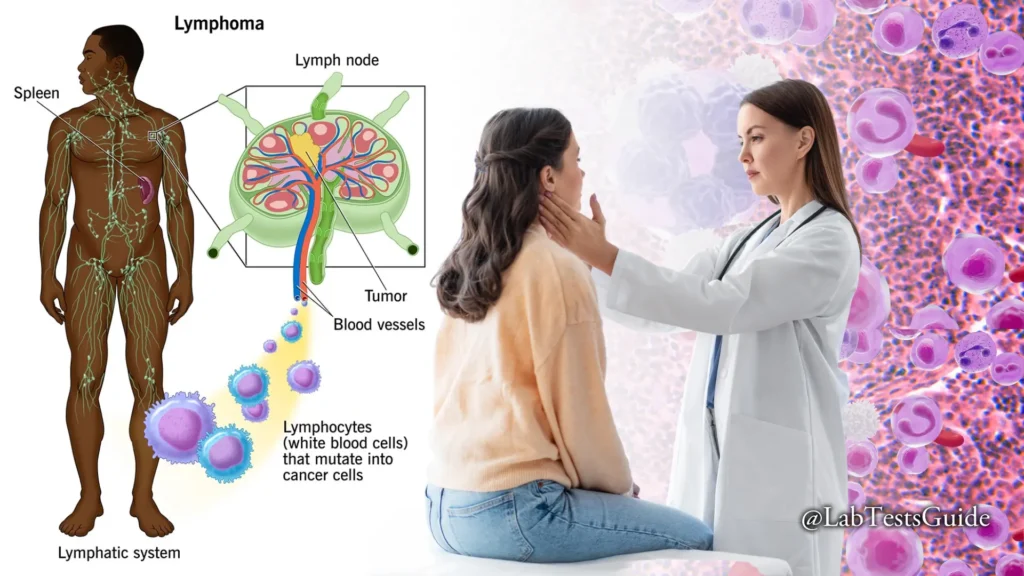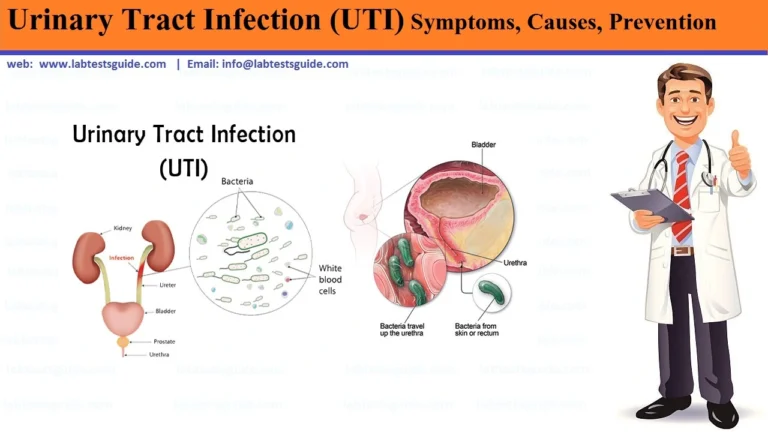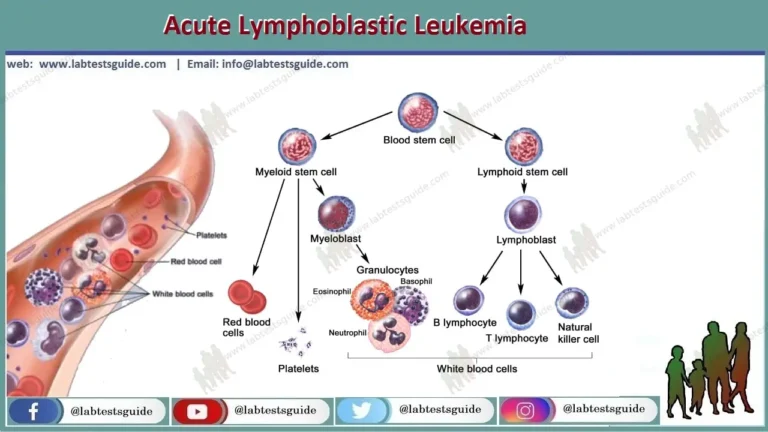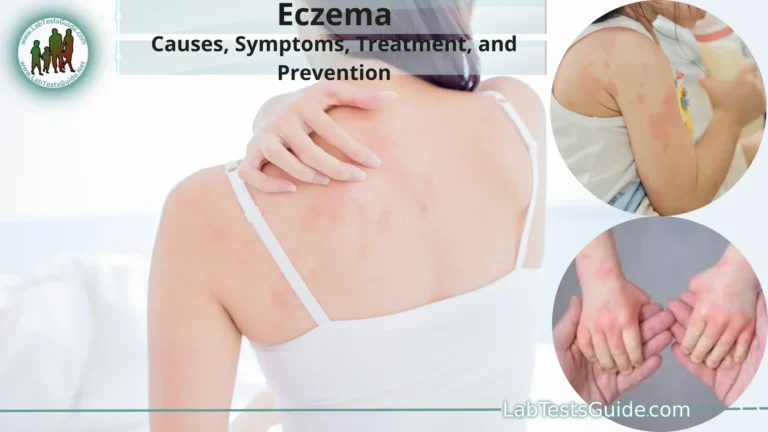Lymphoma: Causes, Symptoms, Diagnosis, Treatment, and Research
Lymphoma is a type of blood cancer that affects the immune system. It specifically affects white blood cells called lymphocytes, which are an important part of the immune system. Lymphoma is also called lymphatic system cancer or lymphatic cancer.

What is Lymphoma?
Lymphoma is a type of blood cancer that affects the immune system. It specifically affects white blood cells called lymphocytes, which are an important part of the immune system. Lymphoma is also called lymphatic system cancer or lymphatic cancer.
What is Lymphatic System?
The lymphatic system, or lymphoid system, is an organ system of vertebrates that is part of the immune system and is complementary to the circulatory system. It consists of an extensive network of lymphatic vessels, lymph nodes, lymphoid organs, lymphatic tissue, and lymph.
Types of Lymphoma:
There are over 70 different types of lymphoma, ranging from indolent (slow-growing) to very aggressive. Lymphomas are classified into two major groups: non-Hodgkin lymphoma and Hodgkin lymphoma. Both types can occur in children or adults.
Most lymphomas start with two main types of white blood cells called lymphocytes: B lymphocytes (B cells) and T lymphocytes (T cells). Cancer cells can travel to different parts of the body, including the lymph nodes, spleen, bone marrow, blood, or other organs. From there, they can build up and form tumors.
Treatment and chances of cure depend on the type of lymphoma and its stage.
- Non-Hodgkin lymphoma:
The most common form of lymphoma is non-Hodgkin lymphoma. It tends to develop in older people. Several types of treatment for non-Hodgkin lymphoma may be used, including chemotherapy, radiation therapy, immunotherapy, targeted therapy, and stem cell transplant. - Hodgkin Lymphoma:
Hodgkin lymphoma is also known as Hodgkin disease. It usually starts in a type of B cell found in the bone marrow. Hodgkin disease is considered one of the most curable forms of cancer, especially if it is diagnosed and treated early. Several types of treatment may be used for Hodgkin lymphoma, including chemotherapy, immunotherapy, and stem cell transplant.
Staging and Grading of Lymphoma:
Lymphoma is usually staged as 1 through 4.
- Stages 1 and 2 non-Hodgkin lymphoma are sometimes called early stage (limited or localized lymphoma).
- Stages 3 and 4 non-Hodgkin lymphoma are sometimes called advanced lymphoma.
In some situations, a large stage 2 lymphoma is treated as advanced disease.
Symptoms of Lymphoma:
Common Symptoms Include:
- Unexplained Fever
- Swollen Lymph Nodes, Such as Those in the Neck or Armpits
- Swollen Belly
- Abnormal Sweating, Especially at Night
- Tiredness
- Loss of Appetite
- Easy Bruising or Bleeding
- Weight Loss
- Frequent Infections
- Cough, Chest Pain, or Difficulty Breathing
- Rash or Itching
Causes of Lymphoma:
Exposure to radiation and certain types of chemicals can increase the risk of lymphoma in some people. Benzene and some agricultural chemicals are implicated; People exposed in the workplace, who may be most at risk, should follow occupational health guidelines to minimize exposure. For people with weakened immune systems, exposure to viruses such as Epstein-Barr virus or HIV can also increase the risk of lymphoma.
Lymphoma Risk Factors:
There are several risk factors associated with lymphoma. Some of these increase the risk of developing lymphoma or specific types of lymphoma.
Having one or more risk factors for lymphoma does not mean that you will develop lymphoma. It means that you are slightly more likely to develop lymphoma than someone without risk factors. Even if you have risk factors, the risk of developing lymphoma is generally very low.
Risk factors for lymphoma include:
- Age
- Sex
- Family History
- Certain Infections
- Weakened Immune System
- Autoimmune Diseases
- Other Conditions
- Possible Additional Factors.
Diagnosis of Lymphoma:
There are several tools to gather complex information about lymphoma to make an accurate diagnosis, including:
Treatment Options:
Lymphoma treatments can vary depending on the type of lymphoma you have, how far it has spread (its stage), and whether you have symptoms. Lymphoma treatments include:
- Chemotherapy
- Radiation Therapy
- Targeted Therapies.
If you have slow-growing lymphoma, you may not need treatment right away, and some people never need treatment. This is called watch and wait.
Lymphoma treatments can have side effects. Some people experience some of these side effects because of the lymphoma itself, even if they do not receive treatment.
Lymphoma Prevention:
Because lymphoma affects the immune system, there are steps you can take to prevent it, such as reducing your risk of getting infections and making lifestyle changes that help maintain a healthy immune system. You can also reduce your risk by:
- Staying physically active.
- Eat a diet rich in fruits, vegetables, and whole grains.
- Avoiding foods like processed meats and sugary drinks.
- Avoiding tobacco.
- Avoiding known risk factors for HIV, such as intravenous drug use or unprotected sex with partners whose HIV status is unknown.
- Maintaining a healthy weight (body mass index less than 25).
- Drinking alcohol in moderation or not at all.
Research and New Developments:
Here is list of Some Research and New Developments in Lymphoma:
- CAR-T Cell Therapy: Personalized T-cell modification to target lymphoma cells.
- Checkpoint Inhibitors: Immunotherapy drugs like pembrolizumab and nivolumab.
- BTK Inhibitors: Targeted therapies, e.g., ibrutinib, disrupting lymphoma growth.
- BCL-2 Inhibitors: Venetoclax for certain lymphoma types.
- Genomic Profiling: Precision medicine based on genetic mutations.
- Next-Generation Sequencing (NGS): Advanced lymphoma genome analysis.
- Improved Stem Cell Transplants: Safer autologous/allogeneic and cord blood transplants.
- Combination Therapies: Mixing chemo, immuno, and targeted therapies.
- Novel Biomarkers: Research on liquid biopsies for early detection.
- Lymphoma Vaccines: Experimental vaccines to prevent relapse.
- Bispecific Antibodies: Drugs like mosunetuzumab and glofitamab in trials.
References
- Lymphoma – what is it, symptoms and treatment | Blood Cancer UK – https://bloodcancer.org.uk/understanding-blood-cancer/lymphoma – (Accessed in Sep 09, 2024)
- Lymphoma – Symptoms and causes – Mayo Clinic – https://www.mayoclinic.org/diseases-conditions/lymphoma/symptoms-causes/syc-20352638 – (Accessed in Sep 09, 2024)
- Lymphoma: Definition, Symptoms, Causes, Diagnosis, Treatment – WebMD – https://www.webmd.com/cancer/lymphoma/lymphoma-cancer – (Accessed in Sep 09, 2024)
- Lymphoma: Symptoms, Causes and Treatment – Cleveland Clinic – https://my.clevelandclinic.org/health/diseases/22225-lymphoma – (Accessed in Sep 09, 2024)
- Types of Lymphoma – Memorial Sloan Kettering Cancer Center – https://www.mskcc.org/cancer-care/types/lymphoma/types – (Accessed in Sep 09, 2024)
- Lymphoma | Causes, Symptoms & Treatments | Cancer Council – https://cancer.org.au/cancer-information/types-of-cancer/lymphoma#cancer-symptoms – (Accessed in Sep 09, 2024)
- Lymphoma Action | Causes and risk factors for lymphoma – https://lymphoma-action.org.uk/about-lymphoma-what-lymphoma/causes-and-risk-factors-lymphoma – (Accessed in Sep 09, 2024)
- Lymphoma Diagnosis & Tests | Penn Medicine – https://www.pennmedicine.org/cancer/types-of-cancer/lymphoma/diagnosis – (Accessed in Sep 09, 2024)
- Lymphoma Prevention | Winship Cancer Institute of Emory University – https://winshipcancer.emory.edu/cancer-types-and-treatments/lymphoma/prevention.php – (Accessed in Sep 09, 2024)
Possible References Used






